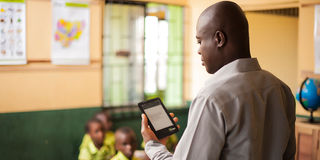Bridging the Gap: Bridge Kenya’s contributions to international literacy
Sponsored by Bridge Kenya

By Griffin Asigo, Managing Director, Bridge Kenya
Every year on September 8, the world celebrates the International Literacy Day to raise awareness about the crucial role literacy plays in our society.
This year, the chosen theme is "Promoting literacy for a world in transition: Building the foundation for a peaceful and sustainable society." Within this theme we find a call to action, a challenge that compels us to reflect deeply on the state of global literacy efforts.
Bridge Kenya, a community-centred educational technology company, is committed to providing education to underserved communities, and stands as a shining example of what can be achieved when we bridge the gap in literacy.
Promoting literacy: Advancing awareness and support
The chosen theme highlights the importance of actively promoting literacy. Shockingly, 50 percent of children in low and middle-income countries cannot read with comprehension by their 10th birthday. Global illiteracy rates stand at 86 percent for individuals above the age of 15.
It is evident that the foundation of literacy is crucial for unlocking opportunities and fulfilling one’s potential.
Kenya's public education system has made significant investments, ranking 8th in education spending among 28 African economies. However, the demand for education exceeds the country’s capacity. This is where community schools like Bridge Kenya partner with the government to complement efforts in promoting literacy, providing affordable access to education for all. By working together, we can fight illiteracy rates more effectively.
A data-driven approach: Using technology to improve literacy outcomes
Bridge Kenya takes a data-driven approach, recognising that promoting literacy is not just about increasing rates but also utilising proven methodologies. Bridge uses data analysis to inform instructional decisions and improve literacy outcomes.
Since 2015, thousands of pupils from Bridge International Academies have consistently outperformed the national average, with some graduates achieving marks placing them in the country’s top one percent. Just imagine the scale of impact if this approach were replicated across public systems. It could position Kenyan pupils to be more competitive academically, matching performance levels achieved by peers from middle and upper-middle income countries.
A world in transition: Navigating change and challenges
In a rapidly changing world, literacy takes on a new dimension. It serves as the key to adaptability and resilience, enabling individuals to access information, evaluate it critically, and make informed decisions to navigate the changes. Bridge Kenya, through its technology-driven methodology, embraces these changes, making learning accessible through digital tools and platforms.
A ground-breaking study by Nobel Prize-winning economist, Professor Michael Kremer in Kenya, reveals that Bridge's scientifically driven approach, utilising technology for literacy programmes, has led to remarkable improvements in learning outcomes. Pupils in Bridge International Academies gain almost an additional year of learning in just two years, a testament to the effectiveness of an integrated methodology. This is a significant leap, considering that the World Bank estimates that 90 percent of 10-year-olds in Sub-Saharan Africa do not reach this benchmark. Kenya’s national strategic plan showed that over 85 percent of Grade 3 pupils cannot arrange alphabetical order words in English and Kiswahili.
Building the foundation: Empowering individuals, communities and societies
Literacy is not just about reading and arithmetic; it equips individuals with the knowledge, skills and confidence to engage fully in their communities. Literacy empowerment is a basic human right, meaning that every child, regardless of their circumstances, should have the opportunity to learn. Equity becomes the cornerstone of quality education. Because accessibility of materials is a challenge, Bridge Kenya offers Online Tutoring and Virtual Support, providing additional support and guidance to learners in their literacy journey. These programmes extend the reach of education, breaking down geographical barriers and ensuring that learning opportunities are available to all.
A peaceful and sustainable society: The ultimate vision
Literacy promotes understanding, empathy and dialogue, fostering peaceful coexistence. It is also intertwined with sustainable development, equipping individuals to address environmental challenges and make informed decisions for a better future. By promoting literacy, we empower individuals to contribute positively to society and build a more inclusive and equitable world.
Bridge Kenya’s efforts align with Sustainable Development Goal 4, aiming to ensure inclusive and equitable quality education for all. By achieving equitable access to education, we break the cycle of poverty and increase GDP growth rates by up to 0.5 percent annually in lower and upper-middle income countries.
In conclusion, this year’s International Literacy Day's theme emphasises the crucial role of literacy in a changing world and its power to build a peaceful and sustainable society. Bridge Kenya exemplifies what is possible when we invest in literacy. By expanding access to quality education, nurturing essential literacy skills, and empowering communities, Bridge International is a beacon of hope and inspiration in the noble quest to promote literacy worldwide.
Here's a statistical infographic highlighting the performance of Bridge pupils across core reading and mathematical competencies.


